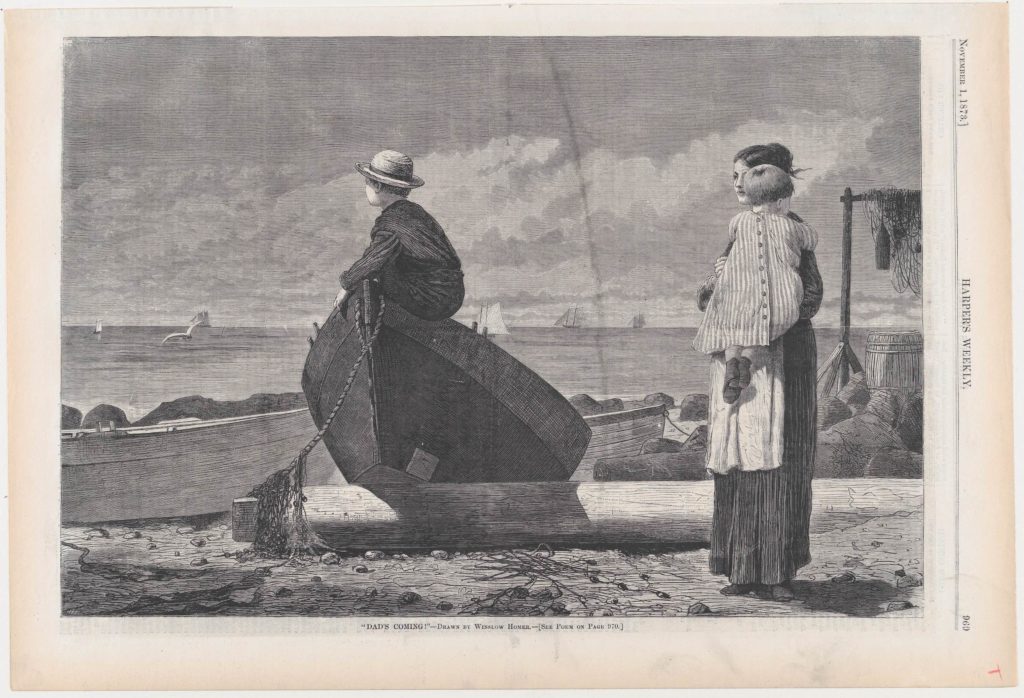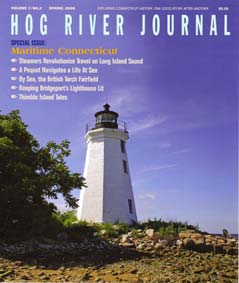By R. Bayreuther Donohue
(c) Connecticut Explored Inc. Spring 2009
Subscribe/Buy the Issue!
Letters quoted are from the George W. Gates Collection, Manuscripts Collection, G.W. Blunt White Library, Mystic Seaport Museum, Inc.
“The Sooner Home the Better”
Seamen’s shipboard exploits are the stuff of maritime history. But what about the families those seamen left behind? By the mid-19th century, the domestic ideal for most Americans featured a working father and house-keeping mother. But when a man made his living at sea, he could be absent from home for months, sometimes years, leaving his wife alone at home to care for their family with very little support from her husband. Women like Julia Fish Gates of Mystic River did their best to cope with their peculiar situations.
Julia married George W. Gates, an established shipmaster in the trade between Galveston, Texas and Europe, probably in the 1850s. Years later, Julia fondly recalled her first years of marriage in a letter:
I often think of the good old days I spent in [the city of]Galveston in the [ship William H.]Wharton. In those days I had no cares and took comfort.”
They returned to Mystic, and from 1860 to 1870 George was master of various steamships that ran cargo between New York and other coastal American ports. New York’s proximity to Mystic allowed him to come home each time his vessel returned. But in August 1870 he took command of the ship Twilight II, sailing the New York-San Francisco-Liverpool circuit. Julia’s letters to him through 1877 reveal her increasing responsibilities and the heartache she suffered during George’s prolonged absences.
Caring for their estate and family was more than a full-time occupation. In March 1871 Julia reassured George about the men hired to help work their land: “I wrote you in my letter last week I think everything in regard to business your farming will be all attended to in the right time by Mr. Stanton. and [sic]Mr. Derby will attend to every thing here.”
Finding domestic help, however, proved more difficult. “I am quite tired of being kitchen girl and I am needed to do so many things at the same time, that I sometimes feel quite discouraged,” she remarked.
Consuming much of this flour were the five Gates children: George, Clifford, Emily, Juliette, and Isaac. Julia voiced a sentiment that rings familiar today when she wrote in March 1871 “The Schools close on Friday for a two week vacation. I presume I shall be glad when it commences again.”
Like other seamen’s wives, Julia also managed the family finances. Credit systems allowed a wife to apply to her husband’s employer for his wages. “You said I had never mentioned drawing money from C.H. Mallory,” Julia says a little defensively in June 1873. “I received [a]check from them in April for $200. I thought I had written to you of my doing so. I pay all my debdts [sic] as I go along except – Grocers and Market Bills… I bought a barrel of flour yesterday price $13.00…. I cook up a barrel of flour in little more than two months.”
However capable a manager and mother Julia Gates was, she never lost her desire to have George home for good – a desire that seemed doomed as the 1870s progressed. In May 1873, Twilight’s San Francisco arrival inspired hope that “your orders will be to come to New York. …If it is Liverpool and then to New York that will do pretty well. But the sooner home the better.” When George’s orders specified Liverpool, she bravely remarked, “I am sorry. …But I must have patience and wait until the close of 1873 before I may have the pleasure of your return.”
By 1876 both lost patience. On June 7 George was bound for California from Liverpool, a prospect that frustrated Julia at “your being gone [on]another year voyage. …I have been looking forward [through]the lonesome Winter thinking that you would be with us again this summer.” Her disappointment was such that she proposed traveling to California over land and sailing home with him. George’s enthusiastic reply instructed her to “shut up the old ranch.” Six months passed before Julia learned of George’s arrival, and then her joy was tempered by his being sent straightaway back to Liverpool, dashing their plans for Julia to join him. “I am wishing daily that I was at home with you,” he wrote on January 8, 1877, “… I feel that I cannot confine myself on ship board much longer as I have been doing for the Last six years.”
The separation between Captain and Mrs. Gates ended in August 1877, when George retired. “13 years I have spent here in this Mansion and I do not think you have spent two years at home altogether during those years,” Julia wailed in 1874. For this shipmaster’s wife, her home was finally perfect.
R. Bayreuther Donohue is the lead 1876 role player at Mystic Seaport.
Explore!
Read more Connecticut Maritime History stories in our Spring 2009 issue and on our TOPICS page.


